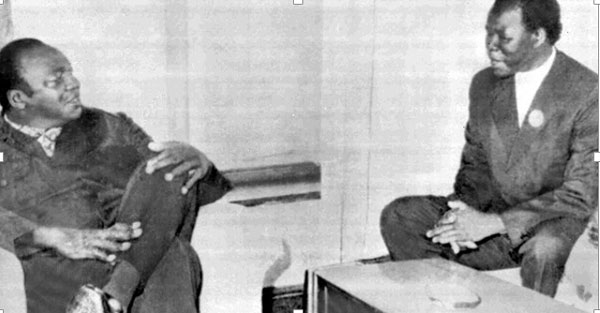
COMMENT | ANDREW BESI | This is how Edem Kodjo described the state of Africa at an Organisation of African Unity (OAU) summit in 1978 – “Our ancient continent is on the brink of disaster, hurtling towards the abyss of confrontation, caught in the grip of violence, sinking into the dark night of bloodshed and death. Gone are the smiles, the joys of life.”
Of course, as you might be aware, especially following the Nakulabye skirmishes of 1964 and the raid on the Lubiiri at Mmengo in 1966, our Uganda was itself a big part of this abyss of confrontation between citizen and state. By 1975, Uganda under Field Marshal Idi Amin was firmly caught up in a deadly grip of violence.
This confrontation between citizen and state reached a new low in 1977 with the murder, on February 16th, of 55 year old Janani Jakaliya Luwum, Archbishop of the Metropolitan Province of the Church of Uganda, Rwanda, Burundi and Boga -Zaire.
His crime was to allow for his Bishops to speak out against Amin’s government for “abusing the authority that God had entrusted to it.” Indeed, it was sermons such as that of Festo Kivengere, delivered on Sunday 30th January 1977 and titled “The Preciousness of Life ” that seems to have, on account of its widespread appeal, irked Amin the most?
Today Uganda is a much changed country. Our now sixty year old Republic enjoys the fullness of democracy (rule by the people) exemplified through regular, free and fair elections.
But to presume that because we enjoy the fullness of “rule by the people ” equates to a high and equitable modern way of life for all would be simplistic. Indeed, although we are now on the verge of being a middle income country, itself not an easy achievement, 3.5 million of our households are currently consigned to the subsistence economy.
A study by the Inspectorate of Government (IG) in conjunction with a leading non-partisan German think tank GIZ, found that “the overall annual cost of corruption in Uganda equals to more than 9.1 trillion Uganda Shillings.”
Of course, at our last electoral cycle in January 2021, then candidate, and now President Yoweri Museveni, emphasised that fighting corruption remains a mainstay of his government. Indeed, the entirety of his Securing Your Future 2021-26 manifesto, in much the same way as the original 10 points program did, is a promise to cause what is termed as “Socio-Economic Transformation.”
In the continuous journey to achieve this, President Yoweri Museveni points out thus: “However, covert corruption has become a big problem in Uganda, which we are determined to defeat. Covert corruption can be broadly classified into two categories: corruption of need and corruption of greed. Corruption of need is fuelled by the struggle to meet basic needs. This will be tackled and defeated differently from that of greed which persists despite the good pay that officials earn.”
Last year, while addressing over 10,000 youths who gathered for an Investment and Patriotism symposium at our ceremonial grounds in Kololo, President Museveni re-echoed his commitment to continue the fight against Corruption. He, however, rightly pointed out that the fight against corruption also requires us the citizens to rise up and say NO! As way of example, he pointed out that for the Parish Development Model to bear good fruit in bringing the 3.5 million households in the subsistence sector into the money economy, the youth MUST “fight corruption wherever you are because you know we have sent money to your parishes,” before adding, “This is your money. Fight for your portion.”
Which brings me to Archbishop Janani Luwum! His murder a few months before the centennial celebrations to mark the arrival of the first Christian missionaries in what is now Uganda, should cause each and everyone of us to reflect on the decadence of morals and abuse of state privilege that now ails our society.
I see no reason why a new Management Information System should cost billions in inflated cost and yet one already exists and is partly why OWC was successful. I see no reason why progress within the four sectors of wealth creation identified by Pres. Museveni should be sacrificed in order to promote the interests of a dodgy company operating out of a bank.
I see no reason why sections of our political class should seek to discredit, at the behest of foreign state and non-state actors, the role of the NRA/M in restoring Uganda. It is this same NRA/M that continues to shape the politics of our region in ways that promise good bounty for all of black Africa.
Perhaps this year’s Janani Luwum Day celebrations will cause us to reject the decadence of thought and parasitism and instead Unite for Service and Growth. Perhaps, at Mucwini this year, “the smiles, the joys of life” will return.
******
The writer works with the Government of Uganda, and a student of ‘Musevenomics’.
On Twitter: @BesiAndrew
 The Independent Uganda: You get the Truth we Pay the Price
The Independent Uganda: You get the Truth we Pay the Price




